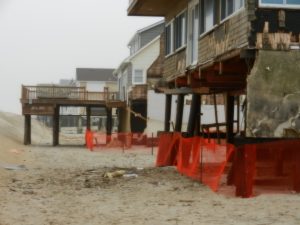Hazards SEES: Bridging Information, Uncertainty, and Decision-Making in Hurricanes using an Interdisciplinary Perspective
PI: Satish Ukkusuri – Purdue; Co-PIs: Pamela Murray-Tuite – Clemson; Seungyoon Lee, Milind Kulkarni – Purdue; Yue Ge – NDSU
Abstract:This multi-institution, interdisciplinary project will develop next generation data driven tools for capturing and mitigating uncertainty in hazards such as hurricanes. Using data from surveys and new data from web experiments and social media for hurricanes, this proje ct will develop new understanding of household level behaviors, how individuals and agencies process uncertainty at different instances of the hurricane onset and the consequences of the household decisions on citywide traffic network congestion. Recent hurricanes demonstrate the importance of developing new scientific methods in this area. Hurricane Sandy is estimated to have caused more than $70 billion in losses in the NY-NJ region while Hurricane Katrina caused significant loss of life; and Hurricanes Katrina and Rita caused traffic chaos. Rapid advances in the use of technology to mitigate information uncertainty, when combined with traditional survey data, allows us to significantly improve our understanding of the complex decision-making before and immediately after a hurricane. This effort will develop data driven modeling and computational systems science approaches, firmly grounded with notions from social science to leverage recent advancements in data gathering to ultimately improve the safety of evacuations and save lives.
ct will develop new understanding of household level behaviors, how individuals and agencies process uncertainty at different instances of the hurricane onset and the consequences of the household decisions on citywide traffic network congestion. Recent hurricanes demonstrate the importance of developing new scientific methods in this area. Hurricane Sandy is estimated to have caused more than $70 billion in losses in the NY-NJ region while Hurricane Katrina caused significant loss of life; and Hurricanes Katrina and Rita caused traffic chaos. Rapid advances in the use of technology to mitigate information uncertainty, when combined with traditional survey data, allows us to significantly improve our understanding of the complex decision-making before and immediately after a hurricane. This effort will develop data driven modeling and computational systems science approaches, firmly grounded with notions from social science to leverage recent advancements in data gathering to ultimately improve the safety of evacuations and save lives.
The intellectual merit of this project involves collecting novel data through post-hurricane mail surveys, personal interviews, web experiments, social media, and process tracing software; developing new integrative scientific approaches to modeling household level behaviors and social network effects across households and other stakeholders; and modeling evacuation logistics for hurricanes, using computational sciences as a supporting discipline. The novelty of the proposed methodologies is that they provide a holistic approach to characterize and model uncertainty in various aspects of hurricane evacuation modeling, social networks, household decision making, and stochastic traffic modeling within an integrative framework. Specific advances pertain to understanding and modeling household processing of uncertainty and household member negotiation for hurricane evacuation decisions, and preparation and assignment of activities to different household members. The sequence of activities and decisions will be investigated and explored through decision trees. Simulation of the evacuation process and traffic will be advanced through parallelization techniques.
The broader impact of this research is a deeper understanding of human behaviors during hurricanes and the complex decision making during evacuations. When translated for practitioners, these outcomes will assist emergency managers and agencies to anticipate transportation and sheltering needs, and enhance community planning prior to hurricanes. These improvements will lead to lower evacuation costs, stress, and loss of life. The research will also promote the integration of household behaviors with traffic simulation leading to better policies. The research team will disseminate the findings to the scientific community and a policy brief to government leaders and web-based presentations to practitioners. Undergraduate students will be involved in the research activities along with female or ethnic minority students.
